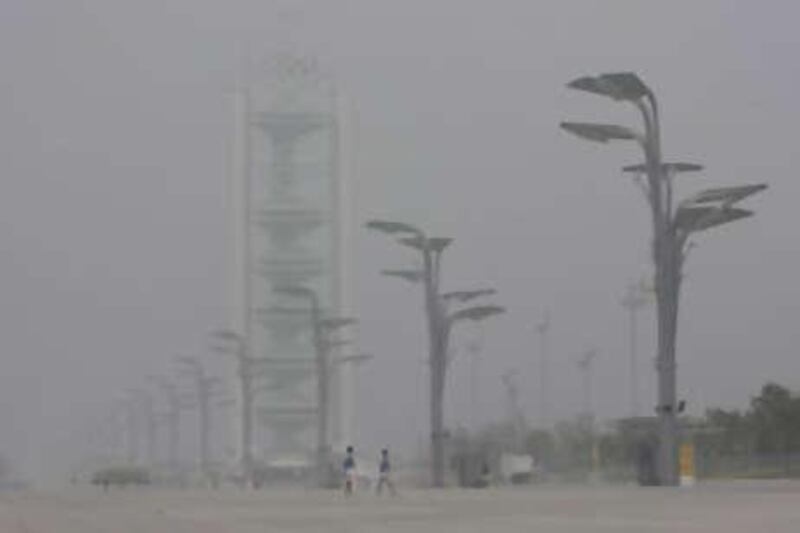BEIJING // Beijing is ready to expand an already drastic pollution-cutting scheme by taking more cars off the roads and shutting more factories if air quality remains a problem during the Olympic games, state media said today. Beijing authorities have cut the number cars on the road and opened new subway lines in the past week, in addition to halting some construction and suspending factory production, in a last-ditch effort to reduce air pollution when the Games open on Aug 8.
But the city has been plagued by hazy skies and sultry weather in the past week, raising fears that the heat and humidity common for Beijing in August may yet spoil the Games. Skies today were again thick with haze. "More vehicles could go off the roads and all construction sites and some more factories in Beijing and its neighbouring areas could be closed temporarily if the capital's air quality deteriorates during the Olympic games," the China Daily said.
Authorities might announce the "special measures" soon, the state-run newspaper said. The city's chronic pollution, a source of respiratory illness, has been one of the biggest worries for Games organisers, who have had to deflect international criticism over air quality and who have struggled to contain the environmental effects of China's breakneck economic growth. The International Olympic Committee has said it may reschedule endurance events to prevent a potential health risk.
Beijing had not experienced a "blue sky day", when the air pollution index stays below the national standard for "good air quality", in four days. An official with the Beijing Environmental Protection Bureau today confirmed that plans for more action were being studied, but he declined to give details. "The measures will be put into place if air quality turns out to be short of the standards we have promised," the official, who would only give his surname, Zhang, said.
Cars are already banned on alternate days depending on their licence plate number ? odd or even ? and many official cars have been ordered off the roads. Taxis, buses and Olympic vehicles are exempt. Heavily polluting factories like steel plants in and around Beijing have also been closed in order to cut emissions. But despite the slew of measures, Greenpeace gave Beijing a mixed report card in an assessment of the city's environmental performance for the Games.
"Greenpeace found that Beijing achieved and in some cases surpassed original environmental goals but also missed some opportunities that could have ensured a better... Olympic legacy," the non-governmental group said in a report. On the positive side, Greenpeace noted the use of energy-saving technology in Olympic venues, stricter vehicle emissions standards and expanded public transport. But it criticised the lack of transparency and independently verified data, and also noted that many of the efforts to improve air quality were short-term.
"Beijing could have adopted clean production measures more widely across the municipality to speed up the improvement of air quality," Greenpeace said. A city environment official said last week that the overall trend was improving, with a 20 per cent reduction in carbon monoxide, nitrogen dioxide and particulate matter ? all pollutants related to vehicle emissions ? since the same period last year.
*Reuters





